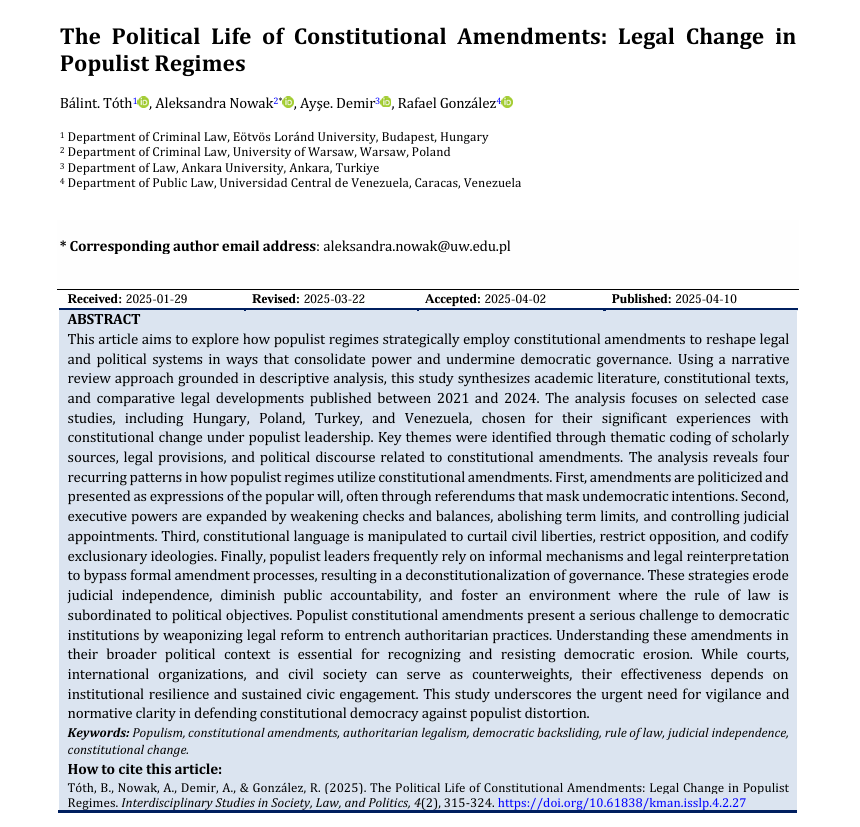The Political Life of Constitutional Amendments: Legal Change in Populist Regimes
Keywords:
Populism, constitutional amendments, authoritarian legalism, democratic backsliding, rule of law, judicial independence, constitutional changeAbstract
This article aims to explore how populist regimes strategically employ constitutional amendments to reshape legal and political systems in ways that consolidate power and undermine democratic governance. Using a narrative review approach grounded in descriptive analysis, this study synthesizes academic literature, constitutional texts, and comparative legal developments published between 2021 and 2024. The analysis focuses on selected case studies, including Hungary, Poland, Turkey, and Venezuela, chosen for their significant experiences with constitutional change under populist leadership. Key themes were identified through thematic coding of scholarly sources, legal provisions, and political discourse related to constitutional amendments. The analysis reveals four recurring patterns in how populist regimes utilize constitutional amendments. First, amendments are politicized and presented as expressions of the popular will, often through referendums that mask undemocratic intentions. Second, executive powers are expanded by weakening checks and balances, abolishing term limits, and controlling judicial appointments. Third, constitutional language is manipulated to curtail civil liberties, restrict opposition, and codify exclusionary ideologies. Finally, populist leaders frequently rely on informal mechanisms and legal reinterpretation to bypass formal amendment processes, resulting in a deconstitutionalization of governance. These strategies erode judicial independence, diminish public accountability, and foster an environment where the rule of law is subordinated to political objectives. Populist constitutional amendments present a serious challenge to democratic institutions by weaponizing legal reform to entrench authoritarian practices. Understanding these amendments in their broader political context is essential for recognizing and resisting democratic erosion. While courts, international organizations, and civil society can serve as counterweights, their effectiveness depends on institutional resilience and sustained civic engagement. This study underscores the urgent need for vigilance and normative clarity in defending constitutional democracy against populist distortion.
Downloads
References
Bolleyer, N., & Salát, O. (2021). Parliaments in Times of Crisis: COVID-19, Populism and Executive Dominance. West European Politics, 44(5-6), 1103-1128. https://doi.org/10.1080/01402382.2021.1930733
Campolongo, F., & Scanni, F. M. (2023). Campaigns and Regimes: Party Characteristics, Political Transformations and the Outcomes of Populist Governments. Comparative European Politics, 21(2), 208-233. https://doi.org/10.1057/s41295-022-00322-4
Coman, R. (2024). Backsliding Populist Governments in the Council: The Case of the Hungarian Fidesz. Politics and Governance, 12. https://doi.org/10.17645/pag.8161
Gárdos–Orosz, F. (2021). The Reference to Constitutional Traditions in Populist Constitutionalism – The Case of Hungary. Hungarian Journal of Legal Studies, 61(1), 23-51. https://doi.org/10.1556/2052.2021.00298
Gouvêa, C. B., & Pedro, H. V. B. C. B. (2021). Structural Political and Legal Approaches in Opposition to Populist Governance. 99-118. https://doi.org/10.1007/978-3-030-85022-7_6
Hoffmann, T. (2022). Illegal Legality and the Façade of Good Faith – Migration and Law in Populist Hungary. Review of Central and East European Law, 47(1), 139-165. https://doi.org/10.1163/15730352-bja10059
Hoffmann, T., & Gárdos–Orosz, F. (2022). Populism and Law in Hungary – Introduction to the Special Issue. Review of Central and East European Law, 47(1), 1-11. https://doi.org/10.1163/15730352-bja10058
Humble, K. P. (2022). Populism and the Threat to International Law. Laws, 11(3), 50. https://doi.org/10.3390/laws11030050
Issacharoff, S. (2023). Caudillos in Command. 101-120. https://doi.org/10.1093/oso/9780197674758.003.0006
Kyriacou, A. P., & Trivin, P. (2024). Populism and the Rule of Law: The Importance of Institutional Legacies. American Journal of Political Science. https://doi.org/10.1111/ajps.12935
Maatsch, A. (2021). Disempowerment Through the Backdoor: The Impact of Populist Parties on the National Parliament in Poland. Parliamentary Affairs, 74(4), 786-801. https://doi.org/10.1093/pa/gsab008
Matczak, M. (2022). The Language of Legal Populism – A Philosophical and Legal Perspective. Radca Prawny(2 (31)), 239-260. https://doi.org/10.4467/23921943rp.22.031.16894
Morawski, L., & Brzeziński, M. (2023). How Do Right‐wing Populist Majoritarian Governments Redistribute? Evidence From Poland, 2005–2019. Social Policy and Administration, 58(3), 521-539. https://doi.org/10.1111/spol.12984
Muhammad Nur Abdul Latif Al, W., Riyanta, S., & Rustam, M. R. (2024). Populism and the Erosion of Democratic Checks and Balances: A Systematic Literature Review Across Regions. International Journal of Multidisciplinary Research and Analysis, 07(10). https://doi.org/10.47191/ijmra/v7-i10-18
Müller, J. W. (2022). ‘Enemies of the People’: Populism’s Threat to Independent Judiciaries. 27-44. https://doi.org/10.5871/bacad/9780197267035.003.0002
Plagemann, J., Rodríguez, C. H., & Destradi, S. (2022). Populist Foreign Policy and Mobilization in Bolivia. Política Revista De Ciencia Política, 60(2), 9-32. https://doi.org/10.5354/0719-5338.2022.68519
Rondonuwu, P. (2023). Quo Vadis Amandemen Konstitusi: Kebijakan Hukum Partisipatif-Populis Versus Representatif-Elitis. Hd, 23(4), 228-241. https://doi.org/10.61234/hd.v23i4.35
Šalamon, N. K. (2023). Legislative and Judicial Responses to the “Refugee Crisis” in Slovenia and Austria: A Comparative Perspective. Two Homelands(57). https://doi.org/10.3986/dd.2023.1.01
Taşçıoğlu, İ. (2024). Revisiting the Debates on the 2010 Constitutional Referendum in Turkey: Democratic Transition or Authoritarian Populism? Marmara Üniversitesi Siyasal Bilimler Dergisi, 12(2), 153-174. https://doi.org/10.14782/marmarasbd.1410719

Downloads
Additional Files
Published
Submitted
Revised
Accepted
Issue
Section
License
Copyright (c) 2025 Bálint Tóth (Author); Aleksandra Nowak (Corresponding author); Ayşe Demir, Rafael González (Author)

This work is licensed under a Creative Commons Attribution-NonCommercial 4.0 International License.





